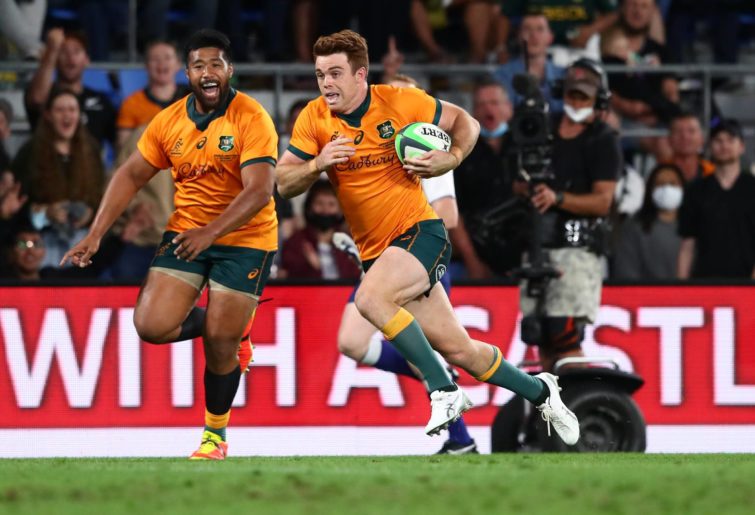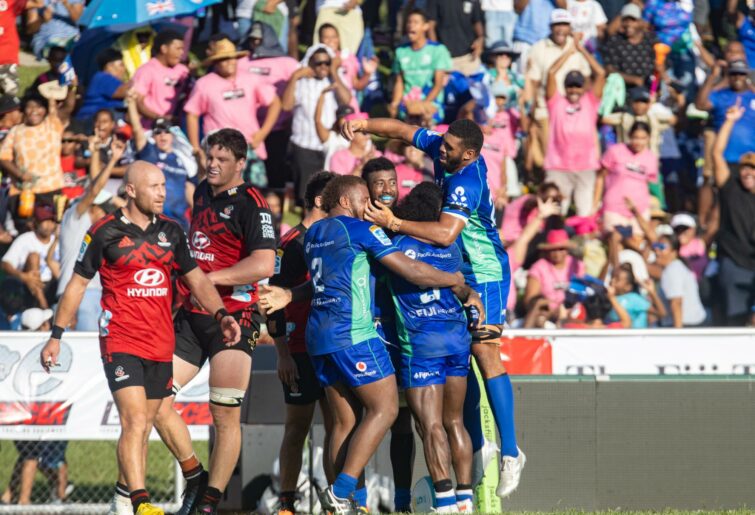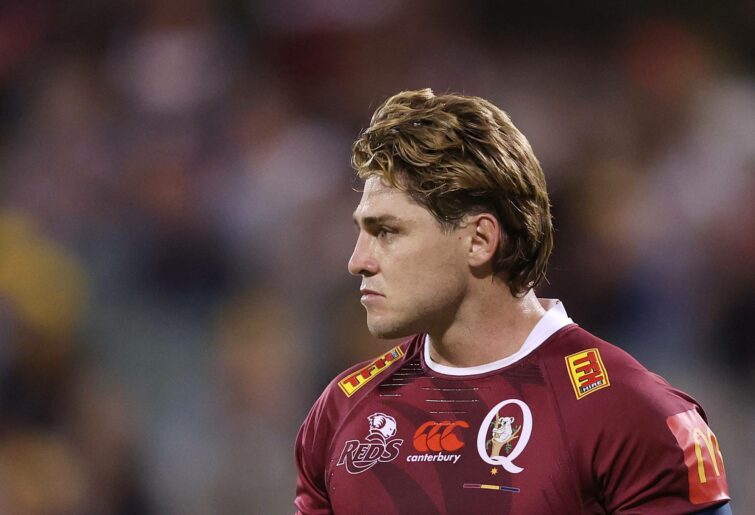It’s hard to know where Stan commentators Tim Horan and Nick McArdle were headed when they questioned the job security of Rebels’ coach Kevin Foote, pre-match on Friday night.
Horan asking Rebels’ director of rugby Nick Stiles if he would be prepared to put his hand up for Foote’s job was remarkable; not only for being made to look foolish by the 34-27 result, but because it showed a gross misunderstanding of how rugby franchises operate.
Stiles identified a franchise model that comprises four pillars: chairman Paul Docherty, CEO Baden Stephenson, himself and Foote, backed by a high-quality support team, including respected coaches Tim Sampson, Geoff Parling and Pom Simona; all of them aligned and working in close harmony.
The Rebels are still a long way from challenging for a Super Rugby title, or even making finals, but there are increasing indications that all of the strategic planning, cohesion emphasis and hard work of the last two years is now beginning to bear fruit.
Careful curation of the player roster has delivered greater depth. Anaru Rangi, Tamati Ioane and Moses Sorovi, accomplished Super Rugby players, sit outside the match day 23. As does ex-Wasps lock Tim Cardall, announced this week as a feature signing for next season, by the Newcastle Falcons. 2022 Wallabies prop Sam Talakai is another to be wearing civvies on match day.
Injured Wallabies Rob Leota, Matt Philip and Andrew Kellaway are all working hard to be able to return to action during the competition. When they do, tough selection discussions loom.

(Photo by Chris Hyde/Getty Images)
Underpinned by commitment to a solid set-piece and a desire to apply pressure at the breakdown, players have been granted licence to play without fear, and are learning to use it. Attacking shape, continuity and speed of ball movement – of a form not typically associated with the Rebels – are the result.
Individual focus zeroed in on 22-year-old flyhalf, Carter Gordon, whose robust defence, prodigious boot and ability to stand flat and square his shoulders to distribute, again impressed.
What appears on the surface to be a sudden revelation is really the product of a well-managed development program, incorporating Gordon’s physical development and a valuable apprenticeship served under Matt To’omua. Perhaps the best thing Wallabies fans can do right now is to enjoy Gordon’s progress for what it is, and let things run their course, without the need to frame his every act in terms of Australia’s long-term solution at flyhalf.
The Rebels got terrific value out of their bench, including a first look for many at ex-Auckland, dynamo loose forward, Vaiolini Ekuasi. Just 21 years old, Ekuasi was singled out in my ‘players to watch in 2023’ column. Now you know why.
The ultimate success or failure of this Rebels team reflects the collective input of all those named above. As head coach, Foote naturally bears high responsibility. But Horan and others should know better than to resort to simplistic ‘praise the coach/sack the coach’ commentary, and pass this off as rugby analysis.
Stern challenges remain for the Rebels, not the least enticing lost support back to AAMI Park. Innovative, low-cost membership and ticketing packages for this season were met with a lukewarm response, partly reflective of a gradual drop-off in support for Super Rugby in all locations that aren’t Fiji, and the breadth of Stan’s coverage.
Having spent two seasons beaten around by COVID, the Rebels’ spotty scheduling continued this week, with a home match scheduled for a holiday long weekend, when attendances have traditionally been low.
On the upside, with few interstate visitors attending Super Round, a crowd of 15,200 at last week’s match versus the Hurricanes hints at better things. Particularly if the Rebels continue to play the positive, attacking brand of rugby shown in the last fortnight.
A seven-point loss to the Rebels in this mood doesn’t spell doom and gloom for the Waratahs. Impacted by late personnel changes, a short six-day turnaround following a bash-a-thon against the Fijian Drua explains away much of their apparent lack of energy.
Taleni Seu’s late try and Tane Edmed’s precision goalkicking salvaged a bonus point, and a two-point bonus swing against the Rebels; ladder points that in a log-jammed mid-table, might prove crucial later on.
The early match wasn’t one for the ages, with the Chiefs typically creative, but prone to kicking ahead after the initial bust had been made. There is concern over a leg injury suffered by All Black lock Tupou Vaa’i, but the Chiefs sit three points clear atop the ladder, with the maximum collected from the first three rounds.
A 28-7 loss felt about right for the Highlanders; brave, improved, but ultimately outclassed.
Saturday afternoon’s thriller in Lautoka was bookended by two penalty shots at goal from in front of the posts. The first, an awful effort by Teti Tela, an early contender for worst kick of the season; the second, by Kemu Valetini, the act that sealed victory for the Drua, 25-24.
As is now customary for the Drua at home, the atmosphere was infectious and all-consuming, and the rugby sometimes messy, but full of thrills and spills. After a tentative start, the Drua dominated the middle of the match and seemed to have things well in hand, until two late tries and a superb sideline conversion from Fergus Burke looked to have spoiled the party.
Not so. Unable to sustain an 80-minute effort last week, this Drua side – the youngest in Super Rugby – is maturing fast. Every visiting rugby player relishes the trip to Fiji for the cultural experience. None of them relish the match itself.

(Photo by Pita Simpson/Getty Images)
The Crusaders copped criticism for fielding a weakened side, but one obvious point to make is that all franchises will be required throughout the season to mine their squad depth.
As important as the best five players are in defining the top teams, you’re also only as good as your players 30-35. Nothing should be taken from the winners; certainly not halfback Frank Lomani, whose stunning, Aaron Smith-esque pass, to create a try for Joseva Tamani, broke the game open.
The policy to rest and rotate All Blacks is also not of the Crusaders’ making. As frustrating and problematic as this may be, Super Rugby has always been subservient to the All Blacks and Wallabies; a situation that doesn’t look like changing any time soon.
It is also worth noting that Drua CEO, Mark Evans, in an excellent edition of The Roar Rugby Podcast last week, suggested that Fiji looks forward to doing the same thing; attracting Test-level players to the Drua, and building cohesion to the benefit of the Fijian national side.
That is of course if the political basket case that is the Fiji Rugby Union, allows it. Fiji versus Wales shapes as a pivotal match in Australia’s World Cup pool. I’ll be there, but what I wouldn’t give for a ticket to the president’s lunch beforehand.
“We are the world’s worst rugby administration.”
“No, we are!”
Meanwhile, Fijian rugby fans keep having the time of their lives. If only audiences in New Zealand and Australia weren’t so jaded and cynical, and took a leaf from the Drua supporters’ handbook. Keep things simple, turn up and enjoy the spectacle.
The Hurricanes took too long to get their discipline and tempo in harness against the Blues, and paid the price, being squeezed out, 25-19. Perhaps the Blues would have been served an injustice had the home side got up; TMO Shane McDermott doing his best Stevie Wonder impersonation in ruling that Josh Moorby grounded the ball on the try-line in the 50th minute.
Like last week in Melbourne, the Blues weren’t as convincing as what their talented list suggests they should be, but they got a busier, more assertive performance out of Hoskins Sotutu, and counter-rucked with heart when they most needed it.
In Canberra, the Brumbies were never able to shake off the Reds, although the final score of 23-17 was probably more convincing than what it sounds. On another night, Nick White’s opening try might have come under closer scrutiny, for the way Tom Wright dragged Fraser McReight out of the play and opened up the running channel, but the impressive Nick Frost led a forward effort that was justly rewarded.
The Reds, as has been their trademark throughout Brad Thorn’s tenure, hung tough, even though being slightly outclassed. They will not only be buoyed by the return of James O’Connor, but to see him fit, spritely and at his creative best.

(Photo by Mark Metcalfe/Getty Images)
Last week in Melbourne, Moana Pasifika conceded a try from the kick-off; this week, it was their turn to score from the kick-off. It was a bright start to a match that degraded into a skills-optional, ill-disciplined affair, where it sometimes felt like there were two teams doing their best not to win.
At 18-18, headed for extra-time with the Force reduced to 13 men, Tim Anstee made the crucial play, charging down a goal-line drop-out, which was duly knocked on in front of the Moana Pasifika posts. The scrum penalty that followed felt inevitable.
On the money was Force coach Simon Cron, bemoaning his player’s propensity to chip the ball ahead in the attacking zone instead of retaining possession and building pressure. It was a point picked up by Kevin Foote on Friday night; the difference between incisive grubbers made with players in forward motion, sprinting into space behind the defence, and low-percentage, ineffectual coach killers.
France made a mockery of their recent poor record at Twickenham, their 53-10 mauling of England an upgrade on the previous high margin of 25 points.
This performance laid to rest any doubts about whether Fabian Galthie’s team had peaked; locks and loose forwards rampaging all over the cabbage patch; stronger, faster and smarter than their opponents, and getting their World Cup campaign back on track – if it was ever off.
As ever when there is a blow-out score, there is the question: were the winners that good, or the opposition that bad?
Coach Steve Borthwick has been left with plenty to fix; but looking at his ponderous defensive line and the way Damian Penaud made Alex Dombrandt and Freddie Steward look like carthorses, it’s asking a lot of any coach to turn slow players into fast ones.































































































